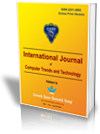Integration of Pedagogical Videos As Learning Object In An Adaptive Educational Hypermedia Systems According To The Learner Profile |
||
 |

|
|
| © 2021 by IJCTT Journal | ||
| Volume-69 Issue-6 |
||
| Year of Publication : 2021 | ||
| Authors : Chelliq Ikram, Erradi Mohamed, Aammou Souhaib, Khaldi Mohamed | ||
| DOI : 10.14445/22312803/IJCTT-V69I6P101 | ||
How to Cite?
Chelliq Ikram, Erradi Mohamed, Aammou Souhaib, Khaldi Mohamed, "Integration of Pedagogical Videos As Learning Object In An Adaptive Educational Hypermedia Systems According To The Learner Profile," International Journal of Computer Trends and Technology, vol. 69, no. 6, pp. 1-6, 2021. Crossref, https://doi.org/10.14445/22312803/IJCTT-V69I6P101
Abstract
The integration of learning objects in adaptive hypermedia systems brings several benefits on an effective adaptation of the content for the learner such as flexibility, accessibility, increased exchanges and interactions. The combination between adaptive hypermedia and pedagogical activities is a fundamental element for the integration and adaptation of Information and Communication Technologies (ICT) in Education and learning objects in learning. In our work, we propose an architecture of an adaptive hypermedia learning system that generates pedagogical videos as an adaptive learning object for learners. We propose four scenarios for the activities and similarly for the pedagogical videos, each scenario is in adequacy and is mainly addressed to a learner after having identified his or her learning style and preferred learning mode according to Kolb and Filder-Silverman model.
Keywords
Pedagogical videos, learning objects, Adaptive hypermedia system, learner profile, Learning style.
References
[1] IEEE-LTSC , IEEE Standard for Learning Object Metadata , 2002.
[2] A. Strijker , Reuse of Learning Objects in Context : Human and Technical Aspects , Thèse soutenue à l’Université de Twente, Enschede, PrintPartners Ipskamp, ISBN : 09-365-2090-9, 452 p., 2004.
[3] P. De Bra , P. Brusilovsky , and G.J. Houben , Adaptive hypermedia: from systems to framework., ACM Computing Surveys (CSUR), 31(4es), 12-es., 1999.
[4] N. Delestre , J.P. Pécuchet, and C. Gréboval , L`architecture d`un hypermédia adaptatif dynamique pour l`enseignement., In Nouvelles Technologies pour l`Information et le Communication dans les Formations d`Ingénieurs-NTICF`98 (pp. p383-390)., 1998.
[5] A. Martin , H.Nejad , S.Colmar,and G.Liem , Adaptability: Conceptual and empirical perspectives on responses to change, novelty and uncertainty., Australian Journal of Guidance and Counselling, pp. 22(1), 58-81 , 2012.
[6] P.Brusilovsky, Methods and techniques of adaptive hypermedia, User Modeling and User Adapted Interaction , 1996.
[7] P. Brusilovsky and E.Millán , User models for adaptive hypermedia and adaptive educational systems, Springer, Berlin, Heidelberg, 2007.
[8] C.J. Butz,S. Hua, and R.B Maguire , A Web-based Bayesian Intelligent Tutoring System for Computer Programming,Web Intelligence and Agent Systems: An International Journal, 4(1). 77-97., 2006.
[9] A.J. Martin , Adaptability and Learning. In: Seel N.M.(eds), Encyclopedia of the Sciences of Learning. Springer, Boston, MA., 2012.
[10] J. Keefe , Learning style: An overview. NASSP`s Student learning styles: Diagnosing and proscribing programs (pp. 1-17)., Reston, VA. National Association of Secondary School Principles., 1979.
[11] Schmeck, R.Ronald , Learning styles of college students, F. Dans Rona , Dillon & R.Ronald , Schmeck (Ed.) Individual differences in cognition, volume 1, New-York: Academic Press, pp. 233-279., 1983.
[12] R. Dunn, K. Dunn, Teaching Secondary Students through their Individual Learning Styles, Practical Approaches for Grades 7-12. Boston: Allyn and Bacon, 1993.
[13] K.L Stewart, L.A Felicetti, Learning styles of marketing majors. Educational Research Quarterly, 15(2), 15-23 , Educational Research Quarterly, 15(2) (1992) 15-23..
[14] D.A Kolb, Experiential learning: Experience as the source of learning and development (Vol. 1), Englewood Cliffs, NJ: Prentice-Hall., 1984.
[15] R. Legendre, Modèle de Kolb , Dans R.Legendre, Dictionnaire actuel de l’éducation, 3e éd., Montréal, Guérin, éditeur ltée, 2005.
[16] R.L Côté, Apprendre, formation expérientielle stratégique , pp. Sainte-Foy, Québec: Presses de l`Université du Québec., 1998.
[17] R.M Felder,L.K Silverman, Learning and teaching styles in engineering education, Engineering education, pp 78(7), 674-681., 1988.
[18] P.Mishra, M.J Koehler, Technological pedagogical content knowledge: A framework for teacher knowledge , 2006.
[19] M. Khaldi , J. Barhone , M. Erradi and M. Khaldi , The educational scenario architecture of a learning situation., Global Journal of Engineering and Technology Advances, 3(1) (2020) 027-040.
